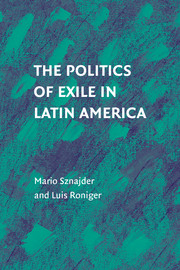Book contents
- Frontmatter
- Contents
- Acknowledgments
- List of Acronyms
- Introduction: The Politics of Exile
- 1 Defining the Exilic Condition
- 2 Forceful Displacement, the Construction of Collective Identities, and State Formation
- 3 The Format of Early Exile
- 4 Sites of Exile
- 5 Widening Exclusion and the Four-Tiered Structure of Exile
- 6 Exile Communities, Activism, and Politics
- 7 Presidents in Exile
- 8 Is Return the End of Exile?
- Bibliography
- Index
- References
8 - Is Return the End of Exile?
Published online by Cambridge University Press: 28 July 2009
- Frontmatter
- Contents
- Acknowledgments
- List of Acronyms
- Introduction: The Politics of Exile
- 1 Defining the Exilic Condition
- 2 Forceful Displacement, the Construction of Collective Identities, and State Formation
- 3 The Format of Early Exile
- 4 Sites of Exile
- 5 Widening Exclusion and the Four-Tiered Structure of Exile
- 6 Exile Communities, Activism, and Politics
- 7 Presidents in Exile
- 8 Is Return the End of Exile?
- Bibliography
- Index
- References
Summary
This final chapter is programmatic rather than conclusive. At its core is a tentative assessment of how exile had an impact on the lives of thousands and the question of whether return means the end of exile, an issue that is multidimensional and open to interpretation. Here, we touch on some of its personal and collective dimensions, examining the multiple effects of exile on the lives of individuals and on the home countries, especially as changes of government and democratization in recent decades created conditions for the return of hundreds of thousands of individuals who had fled abroad.
Living abroad and interacting with host societies, exiles experienced significant personal changes and ideological shifts in the way they conceived issues such as political activism, gender, race, ethnicity, and national unity. With the crystallization of new perspectives, the experience of exile affected political and social processes in the home countries, especially as part of the communities of exiles' attempted return and home countries and international organizations supported the move. Some of these effects and impacts of prospective and actual return are presented hereafter, opening issues that will constitute the basis of future research.
In parallel, as we review these aspects, we claim that democratization cannot close the book on either the effects of exile or on the possibility of new cases of exile.
- Type
- Chapter
- Information
- The Politics of Exile in Latin America , pp. 286 - 324Publisher: Cambridge University PressPrint publication year: 2009



